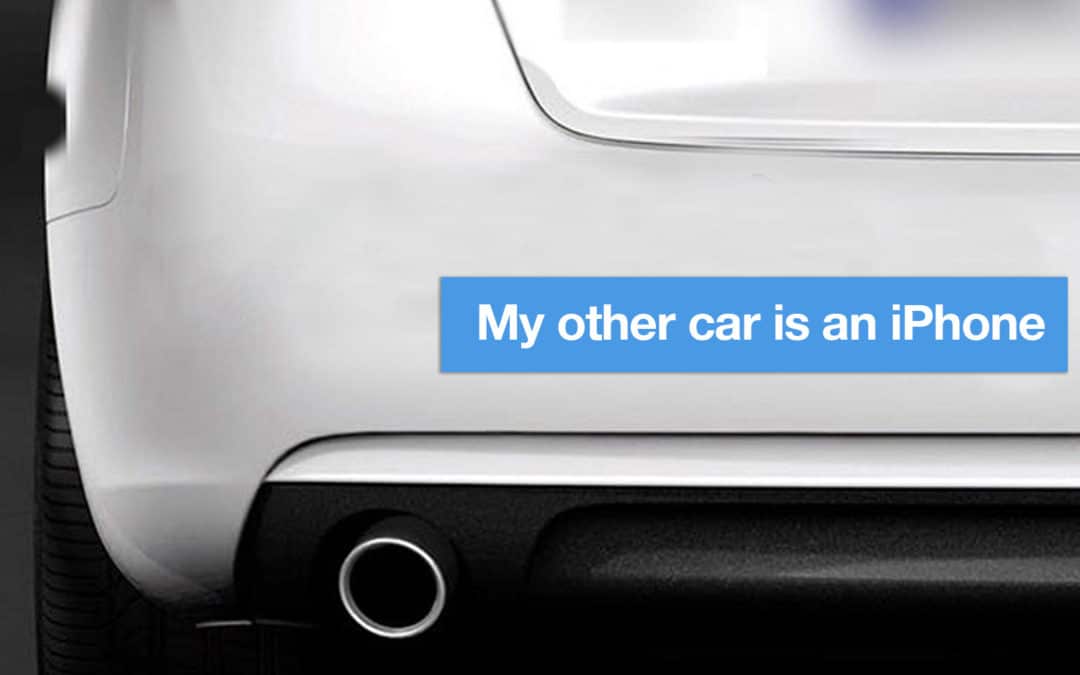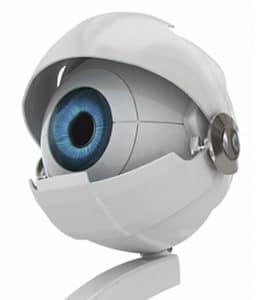Apple’s disturbing confession
My bubble has officially been burst.
Though I’ve had issues with iPhone naming for years, I’ve always assumed there was an underlying strategy, enigmatic as it might be.
Apparently I was giving Apple too much credit.
When Phil Schiller sat down with Engadget recently, he casually confessed that the S and the R have no real meaning. They’re just letters.
This news doesn’t exactly collapse the space-time continuum. However, it does rattle my personal belief system. Let me explain—
Steve Jobs did the big things well, but as we know, he also did a lot of smaller things well. One of which was his ability to attach simple, memorable names to breakthrough products.
After all the work that went into creating Apple’s objects of lust, he wasn’t about to muck them up with confusing names. He cracked the whip on the name-crafters as heartily as he did the designers and engineers.
This was in stark contrast to Apple’s Steve-less years. When Performas and Quadras roamed the earth, the English character set was routinely looted to create ever more confusing names. (Performa 6290CD, anyone?)
It’s been disappointing to see Apple struggle with iPhone naming for so many years. With XS, XS Max and XR, we now have a family of iPhone names Gil Amelio would be proud of.
In his interview, Phil is confirming that iPhone naming is no longer born of Steve Jobs-level vigor.
After admitting that the letters have no meaning, he shared what they mean to him personally.
“I love cars and things that go fast, and R and S are both letters used to denote sports cars that are really extra special.”
I”m glad Phil has found a way to explain away the complexity. However, the internet has failed to guess this sports-car reference despite its many attempts to solve the mystery.
For most of us, the S and R have simply been unexplained mysteries. Until Phil explained.
To keep Phil honest, I searched on “fastest sports cars” and “best sports cars.” I only see a scattering of S and R models in the Top 10 lists. In many cases these letters are diluted as part of a combination, like “GTS.” Maybe he’ll offer another explanation down the road.
That aside, it’s hard to buy the argument that a single iPhone letter can evoke the feeling of a product from a different category? Given common usage, XS is far more likely to make people think “Extra Small” than “extra special sports car.”
Phil’s rationale gets even sillier when you remember how he explained the S in the very first S-named iPhone (iPhone 3GS).
“The S simply stands for speed, because this is the most powerful, fastest iPhone we’ve ever made.”
Apparently, Phil wasn’t thinking sports cars back then. One could argue he wasn’t thinking, period. After all, every new flagship iPhone is “the most powerful, fastest iPhone ever made”—even when it comes in a non-S year.
The big question is: who cares about any of this? So Phil spins a few tales. Big deal. iPhone sales keep growing and AAPL keeps rising. It’s all good, right?
If that’s what you think, you don’t truly understand Apple. It became the first trillion-dollar company because it had been investing in its future for 20 years. For Steve Jobs, it was never all about today. He built a rich ecosystem and paid attention to details other companies rarely do—including product naming.
I foolishly cling to the idealistic notion that a company’s values really do determine its long-term success. So I find it unsettling when Phil Schiller innocently tosses out the comment that the letters in an iPhone name have no meaning.
What he’s doing is casually tossing aside one of the values that has always set Apple apart.
In the world of Apple, every tiny detail is important. Some guy who used to be CEO taught me that it all adds up.


Thanks for beating the drum on this, Ken. It’s baffling to see how Apple is handling naming. It feels like “don’t care,” which I don’t expect from Apple.
I don’t claim it is the source but here in good old Blighty – birth place of Jonathan Ive, Ford used to have a series of hot hatchbacks called the Fiesta XR2 and then the Fiesta XR3. There was also the Sierra XR4, the Sierra was in American speak a ‘sedan’ in ‘proper’ English 😉 it is a ‘saloon’ and the 4 in this case refers to it being a 4-wheel drive souped up model.
Ford have not used the XR letters for a long time, they now use ST.
It is certainly consistent that car manufacturers do use semi random jumbles of letters.
Don’t buy Phil Schiller’s naming explanation. It seems pretty obvious that R denotes the LCD Retina display.
Agree with you wholeheartedly that product naming is incredibly important and poorly handled by so many companies. I think Apple’s best was their “i” branding. Interested to know if this was Steve?
I was deeply involved in brand development in the UK in the nineties and it seemed obvious at the time that “i” branding was there for the taking. All credit to Apple for seeing the opportunity and embracing it.
The i didn’t come from Steve. As TedC says below, Steve had to get past his initial dislike for the i. Yes, it started with iMac, which I named mostly out of logic. The concept of that first model was “the easy way to the internet”—so i for internet and Mac for Macintosh made sense. I wish I could say we were primarily motivated to seize the opportunity you describe, but at this point none of us (Steve included) understood how important the i was to become. Honestly, we were more focused on trying to help Apple survive another day, so it could do even better things in the future. Things worked out rather well, considering!
It is interesting to speculate where the heck they’re going to take this naming scheme next year.
The laptop product line is in a similar state of naming confusion, what with the “Macbook Air” (even the new one) being larger and heavier than the regular “Macbook”. When the Macbook debuted, I assumed it was the beginning of a transition, but here we are years later and all the products are still in the product line with the same names and characteristics.
Sometimes Apple makes me eat my words. I’ve always said that when the new MacBooks are revealed, they’d correct the problem of the MacBook Air being heavier than the MacBook. Maybe next year?
Read Ken’s book – he personally stopped Steve from calling the iMac the MacMan (like WalkMan™ or maybe PacMan) – but once Steve got on the i-Kick, it was i-everything – iPod, iTunes, iMovie, iPad – he even bought iPhone name from Cisco.
A rose by any other name would smell as sweet. Methinks you protest too much.
You’re right, but this S nonsense started under Steve, in fact we had 4 and then 4s the next year. Really should have been an iPhone 5 instead of 4s.
I’m disenchanted with Apple lately, after being a fan for 35 years. I’m afraid they have peaked, and while it may take awhile, who is going to replace Tim? The Steve DNA is dissipating in less than a decade. I hear employees say it’s become a PC gestapo state working there too.
Correct. I often point out that Steve was behind the original S-names. I also point out that Steve was not infallible. There are a host of Apple failures that came directly from him. He also had a pretty good track record when it came to correcting mistakes. Since he didn’t act quickly to get rid of the S-naming thing, we can only assume he was okay with it. Whether he would have remained okay with it for many years thereafter—will never be known.
Though I have been a supporter of Cook, I also think Apple is the kind of company that thrives under a true visionary, and without that … things change.
Hey Ken, could you please put a TRIGGER WARNING on this post? “Performa 6290CD”? What?? Are you trying to get me curled up in a fetal ball, crying??!?!1?
Wow, those -were- our rough years. I can only hope that the Apple employee that brought that model forward to actual retail has had the requisite therapy and is properly reformed.
And, just as with the gist of your post, I too see far too much laxity coming from Apple, straying from foundational “principles”. Only, I fear the current crew might have learned this FROM Steve, him perhaps having taken some wrong life lessons from emotionally difficult events. Phil Schiller seems to be particularly untethered though, IMHO. It’s just… he has said some completely nonsensical things in his time.
The VALUE of the latest devices Apple has been shipping is my beef; ASP doesn’t equal VALUE, and today’s Apple, as with the Performa-salad-shipping Apple, doesn’t seem to grasp the true importance of Value over Price or Profit, as a Principle. If the value proposition is out of whack, then the names and suffixes are merely marketing drivel; and that was, I thought, the kind of lemming vapidness Apple fundamentally opposed.
I like to provide readers with a little shock therapy to start their day 🙂
I’m of mixed feelings about a lot of this. I do believe that Apple still has Steve’s DNA. The problem to me is more that Steve often went by instinct, and he had incredibly good taste when it comes to products and marketing. That’s the thing that Apple can never replace, and sometimes it visibly sputters as a result. Steve also was brutal when it came to detail. Nothing escaped his eye, and he demanded perfection from all. That made him tough to work with, but it also made Apple’s customer experience far more satisfying.
The names are terrible. However, how much better would it have been if Phil had simply said this…
“As we’ve talked about before, the S stands for speed, we use it to denote a mostly computational step up in the current design model. The R is new. The iPhone X was so ahead of its time that we had a lot of new technology to bring down to a lower price point. The iPhone Xr is our vision for bringing the best of breed technology into a package that can reach the most people. The R stands for reach. I don’t know if we will need to keep using these to denote future releases, because you just don’t have as big a leap as the iPhone X was every cycle.”
Ah, but yeah, he didn’t say that.
Much better, thanks. I would only mix the idea of explaining away the S as a “mostly computational step,” since some of the greatest iPhone leaps have come in the S models. I think Apple shoots itself in the foot with its S-naming. What’s the point of training your customers to believe that your big innovations come every other year? It only feeds the misperception that Apple has fallen behind as an innovator.
Thought provoking. And a bit sad. Thx for your thoughts.